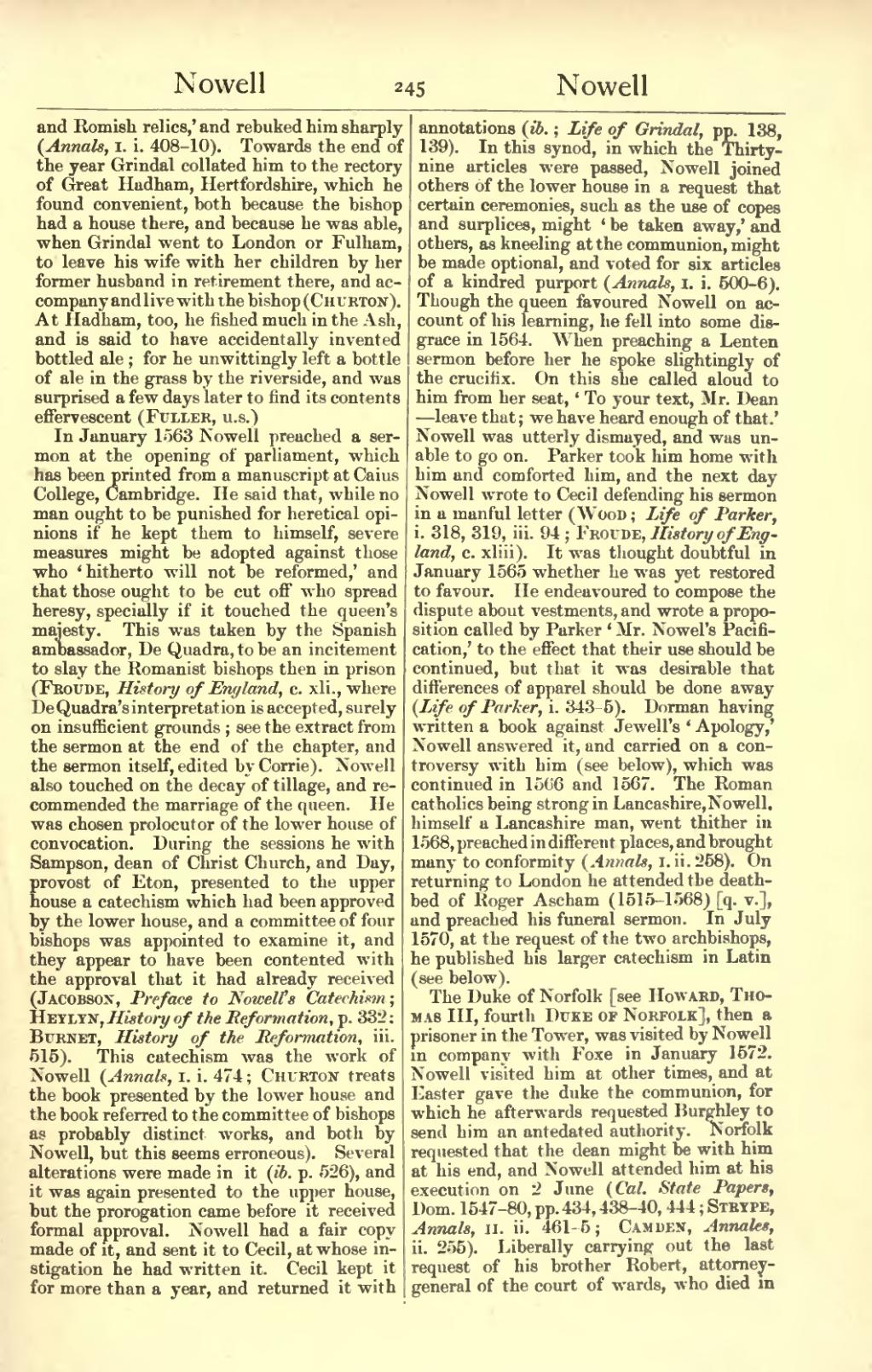and Romish relics,’ and rebuked him sharply (Annals, i. i. 408–10). Towards the end of the year Grindal collated him to the rectory of Great Hadham, Hertfordshire, which he found convenient, both because the bishop had a house there, and because he was able, when Grindal went to London or Fulham, to leave his wife with her children by her former husband in retirement there, and accompany and live with the bishop (Churton). At Hadham, too, he fished much in the Ash, and is said to have accidentally invented bottled ale; for he unwittingly left a bottle of ale in the grass by the riverside, and was surprised a few days later to find its contents effervescent (Fuller, u.s.)
In January 1563 Nowell preached a sermon at the opening of parliament, which has been printed from a manuscript at Caius College, Cambridge. He said that, while no man ought to be punished for heretical opinions if he kept them to himself, severe measures might be adopted against those who ‘hitherto will not be reformed,’ and that those ought to be cut off who spread heresy, specially if it touched the queen's majesty. This was taken by the Spanish ambassador, De Quadra, to be an incitement to slay the Romanist bishops then in prison (Froude, History of England, c. xli., where De Quadra's interpretation is accepted, surely on insufficient grounds; see the extract from the sermon at the end of the chapter, and the sermon itself, edited by Corrie). Nowell also touched on the decay of tillage, and recommended the marriage of the queen. He was chosen prolocutor of the lower house of convocation. During the sessions he with Sampson, dean of Christ Church, and Day, provost of Eton, presented to the upper house a catechism which had been approved by the lower house, and a committee of four bishops was appointed to examine it, and they appear to have been contented with the approval that it had already received (Jacobson, Preface to Nowell's Catechism; Heylyn, History of the Reformation, p. 332; Burnet, History of the Reformation, iii. 515). This catechism was the work of Nowell (Annals, i. i. 474; Churton treats the book presented by the lower house and the book referred to the committee of bishops as probably distinct works, and both by Nowell, but this seems erroneous). Several alterations were made in it (ib. p. 526), and it was again presented to the upper house, but the prorogation came before it received formal approval. Nowell had a fair copy made of it, and sent it to Cecil, at whose instigation he had written it. Cecil kept it for more than a year, and returned it with annotations (ib.; Life of Grindal, pp. 138, 139). In this synod, in which the Thirty-nine articles were passed, Nowell joined others of the lower house in a request that certain ceremonies, such as the use of copes and surplices, might ‘be taken away,’ and others, as kneeling at the communion, might be made optional, and voted for six articles of a kindred purport (Annals, i. i. 500–6). Though the queen favoured Nowell on account of his learning, he fell into some disgrace in 1564. When preaching a Lenten sermon before her he spoke slightingly of the crucifix. On this she called aloud to him from her seat, ‘To your text, Mr. Dean—leave that; we have heard enough of that.’ Nowell was utterly dismayed, and was unable to go on. Parker took him home with him and comforted him, and the next day Nowell wrote to Cecil defending his sermon in a manful letter (Wood; Life of Parker, i. 318, 319, iii. 94; Froude, History of England, c. xliii). It was thought doubtful in January 1565 whether he was yet restored to favour. He endeavoured to compose the dispute about vestments, and wrote a proposition called by Parker ‘Mr. Nowel's Pacification,’ to the effect that their use should be continued, but that it was desirable that differences of apparel should be done away (Life of Parker, i. 343–5). Dorman having written a book against Jewel's ‘Apology,’ Nowell answered it, and carried on a controversy with him (see below), which was continued in 1566 and 1567. The Roman catholics being strong in Lancashire, Nowell, himself a Lancashire man, went thither in 1568, preached in different places, and brought many to conformity (Annals, i. ii. 258). On returning to London he attended the deathbed of Roger Ascham (1515–1568) [q. v.], and preached his funeral sermon. In July 1570, at the request of the two archbishops, he published his larger catechism in Latin (see below).
The Duke of Norfolk [see Howard, Thomas III, fourth Duke of Norfolk], then a prisoner in the Tower, was visited by Nowell in company with Foxe in January 1572. Nowell visited him at other times, and at Easter gave the duke the communion, for which he afterwards requested Burghley to send him an antedated authority. Norfolk requested that the dean might be with him at his end, and Nowell attended him at his execution on 2 June (Cal. State Papers, Dom. 1547–80, pp. 434, 438–40, 444; Strype, Annals, ii. ii. 461–5; Camden, Annales, ii. 255). Liberally carrying out the last request of his brother Robert, attorney-general of the court of wards, who died in
